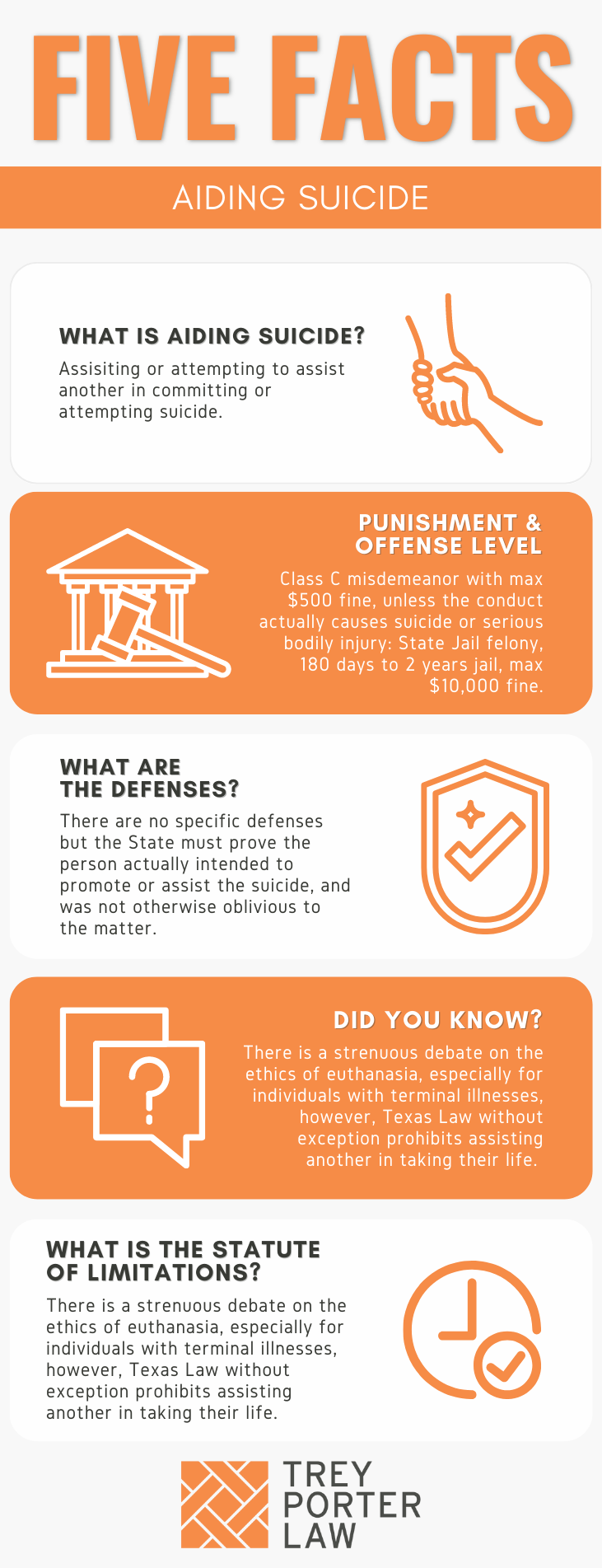WHAT IS THE OFFENSE OF AIDING SUICIDE IN TEXAS?
Texas law prohibits aiding suicide, which is any action that indirectly allows or encourages another to commit suicide.
WHAT IS THE AIDING SUICIDE LAW IN TEXAS?
Tex. Penal Code § 22.08. AIDING SUICIDE.
(a) A person commits an offense if, with intent to promote or assist the commission of suicide by another, he aids or attempts to aid the other to commit or attempt to commit suicide.
(b) An offense under this section is a Class C misdemeanor unless the actor’s conduct causes suicide or attempted suicide that results in serious bodily injury, in which event the offense is a state jail felony.
WHAT IS THE PENALTY CLASS FOR AIDING SUICIDE IN TEXAS?
Aiding suicide is a state jail felony, punishable by 180 days to two years in a state jail facility, if a one’s conduct actually leads to another’s death by suicide, or an attempted suicide that results in serious bodily injury. Aiding suicide is otherwise a Class C misdemeanor, punishable by a maximum fine of $500.
WHAT IS THE PUNISHMENT RANGE FOR AIDING SUICIDE IN TEXAS?
Aiding suicide charged as a state jail felony carries between 180 days and two years in a state jail facility, and a maximum fine of $10,000. If classified as a Class C misdemeanor, aiding suicide is only punishable by a fine of up to $500.
WHAT ARE THE PENALTIES FOR AIDING SUICIDE IN TEXAS?
A person charged with aiding suicide as a state jail felony may be eligible for probation after a conviction, or deferred adjudication without a conviction for a period between two and five years, with the possibility of extending supervision for up to ten years. If a person charged with aiding suicide as a Class C misdemeanor prefers to avoid a conviction, he or she may be placed on deferred adjudication for up to 180 days.
WHAT ARE THE DEFENSES TO AIDING SUICIDE IN TEXAS?
Justification defenses may be raised in a prosecution for aiding suicide, but a person may also raise any defense in an attempt to negate at least one of the elements the State must prove at trial.
WHAT IS THE STATUTE OF LIMITATIONS FOR AIDING SUICIDE IN TEXAS?
The limitation period for aiding suicide charged as a Class C misdemeanor is two years. If aiding suicide is a state jail felony, the limitation period is three years.
AIDING SUICIDE IN TEXAS
Texas law leaves no room for a person to assist another in taking his or her own life. Aiding suicide encompasses actions which may indirectly contribute to another’s voluntary suicide, such as providing access to poison or a gun. It is distinguishable from homicide—the passive assistance is punishable as aiding suicide, while actively participating in killing another, even with the person’s consent, is homicide.













